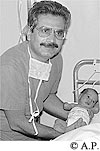Nước Anh Đã Tạo 155 phôi Bào Thú Lai Người, Tại 3 Phòng Thí Nghiệm Của 3 Đại Học Anh.
Các nhà khoa học đã tạo ra hơn 150 phôi bào thú lai người tại các phòng thí nghiệm ở Anh Quốc.
Các phôi bào lai đã được tạo ra bí mật trong hơn 3 năm qua bởi nhiều nhà nghiên cứu tìm kiếm việc chữa trị cho nhiều loại bệnh.

Sự tiết lộ xảy ra chỉ một ngày sau khi một ủy ban các nhà khoa học cảnh báo về ác mộng tình cảnh “Hành tinh của những dã nhân” trong việc tạo ra những tạo vật thú lai người đi quá xa. Tối hôm Thứ Năm một người vận động chống lại những vượt quá của nghiên cứu y khoa nói rằng ông ấy thù ghét những nhà khoa học “đang mô phỏng những bức tượng kỳ cục.” Số liệu được thấy trong báo the Daily Mail cho thấy 155 phôi bào hỗn hợp, gồm cả chất liệu giống người và thú vật, được tạo ra kể từ vụ đệ trình Luật Phôi Bào Thụ Tinh Nhân Tạo năm 2008.
Việc tạo phôi bào lai đa dạng này là hợp pháp, gồm trứng thú vật thụ tinh với tinh trùng con người; “lai”, mà trong đó tế bào con người được cấy vào trong tế bào thú vật; và “quái vật” mà trong đó tế bào con người được trộn lẫn với phôi bào thú vật.
Các nhà khoa học nói rằng những kỹ thuật có thể được dùng để phát triển các tế bào gốc thuộc phôi bào mà có thể được sử dụng để trị liệu nhiều thứ bệnh khó chữa. 3 phòng thí nghiệm tại nước Anh — tại Trường Cao Đẳng King’s College ở London, Đại Học Newcastle University và Warwick University — được cấp giấy phép để thực hiện nghiên cứu sau khi Luật nói trên có hiệu lực.
Tất cả đều đã ngưng việc tạo ra phôi bào đa dạng vì thiếu tiền tài trợ, nhưng các nhà khoa học tin rằng sẽ có thêm nhiều công tác như vậy trong tương lai. Tin này được công bố cho Dân Biểu Baron Alton theo sau cuộc chất vấn của Quốc Hội Anh.

The technique is similar to the one used to produce Dolly the sheep and involves injecting cells from the infertile father into an egg, which is then implanted in the mother’s uterus. The resulting child would have the same physical characteristics as his father and infertile parents would not have to rely on sperm donors.
Human cloning plans revealed
Eight British women are reported to be among those who have volunteered to be impregnated with cloned embryos in the project, which is led by controversial fertility doctor Professor Severino Antinori.
Prof Antinori will discuss the scientific and medical aspects of human cloning during a panel discussion at the National Academy of Sciences in Washington DC.
The Italian Medical Association has already launched disciplinary action against Prof Antinori for his stated plans, which would also violate European cloning guidelines.
Mario Falconi, the vice president of Rome’s medical association, said the professor could be barred from practising in Italy altogether.
Campaigner Professor Jack Scarisbrick, national director of Life, said: “The sooner he (Antinori) is run out of town, the better.”
Prof Antinori told an Italian newspaper that 1,300 couples in the US and 200 in Italy are candidates for his research and that he plans to start cloning embryos in November.
Prof Scarisbrick said: “What he is proposing to do is something which is morally quite unacceptable.
“It is manufacturing human beings in a new and exploitative way.”
He added: “We are saying human beings should not be manufactured in laboratories.
“He is the unacceptable face of modern medicine. I am delighted the Italians have taken this strong line with him.”
Prof Antinori runs a Rome fertility clinic which enabled a 62-year-old woman to have a baby in 1994. Two years he later helped a 59-year-old British unmarried mother to have twins.
The technique is similar to the one used to produce Dolly the sheep and involves injecting cells from the infertile father into an egg, which is then implanted in the mother’s uterus.
The resulting child would have the same physical characteristics as his father and infertile parents would not have to rely on sperm donors.
Read more: http://www.dailymail.co.uk/news/article-64946/Human-cloning-plans-revealed.html#ixzz1T2C2fTdv

Lords defeat looming over human cloning
The Government is tonight facing defeat in the House of Lords over its plans to rush through laws legalising human cloning.
A powerful lobby of religious leaders is urging Lords to reject a call from ministers to support changes to the human fertilisation and embryology regulations.
The Government wants to allow testing on stem cells derived from human embryos for the purposes of research.
But, in a Lords debate tonight, the Archbishop of Canterbury has joined forces with the Roman Catholic archbishops of Glasgow and Westminster, the Chief Rabbi and the President of the Muslim College, to protest at the way the Government is changing the law.
They have sent an open letter to all peers which says: ‘These complex questions deserve to be examined in far greater detail than a brief parliamentary debate on an unamendable order would permit.
‘We would therefore strongly urge the referral of these matters to a select committee of your Lordships House where evidence may be weighed in a calm and sober manner.’
Lord Alton has tabled an amendment calling for the issue to be first looked at by a select committee. The order was backed by MPs despite protests last month.
Conservative Baroness Blatch, who plans to support Lord Alton’s amendment from the backbenches, said: ‘The way the Government is handling this is a constitutional outrage. The Government is abusing parliamentary procedure here. This is secondary legislation on a fundamental principle, which cuts across all parties and religions.
‘The House of Lords is the only chamber in the land that can take on the Government and we will give it our best shot.’
The potential of cloning first came to the world’s attention in July 1996 when the Roslin Institute in Edinburgh unveiled Dolly the sheep – the first animal to be successfully cloned from an adult cell.
At present, no law forbids human cloning using the technique which produced Dolly the sheep – because such advances were not envisaged when the legislation was drafted.
But in practice, the Human Fertilisation and Embryology Authority, which licenses research of this kind, would never grant permission for reproductive human cloning.
The new law will make it illegal to produce an embryo clone and plant it into a woman’s womb. However, when the bill becomes law, scientists will be allowed to harvest pre-programmed stem cells from human embryos under 14 days old for use in medical research.
Read more: http://www.dailymail.co.uk/news/article-17047/Lords-defeat-looming-human-cloning.html#ixzz1T2AiyUBx










































